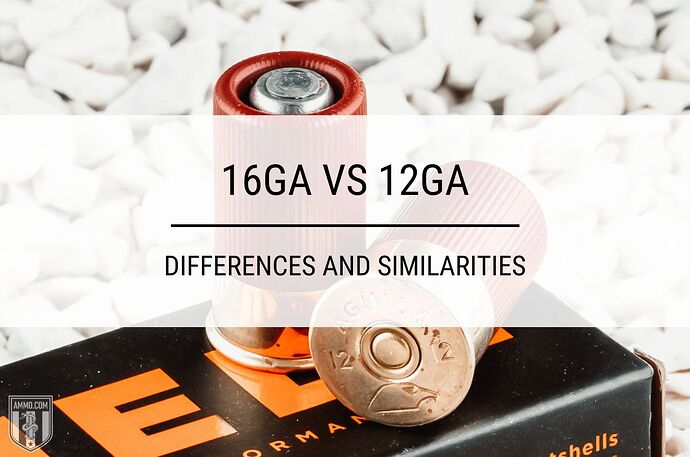Undoubtedly, the 12 gauge is more prevalent in the U.S. than the 16 gauge. Should this be the case?
When we compare the 16ga vs 12ga, is the 12 gauge overwhelmingly better?
Ballistically speaking, I don’t believe so; however, I’m not in a hurry to trade my 12ga shotgun in for a 16ga anytime soon.
You’ll see why as we pit the 16 and 12 gauges against each other in nine categories that all shotgunners should consider.
16ga vs 12ga: Performance Comparison
There’s an old saying about the 16 gauge that goes something like “carries like a 20, shoots like a 12”, well we’re going to put that to the test in this article.
We will see how well modern shotgun gauges perform in real-world situations, not only on a ballistics table.
But first, we will learn the differences in the shell size.
Shell Specs
Understanding the difference in shotgun gauges is confusing for most people to grasp at first because it’s backward from handgun and rifle calibers.
With rifle and handgun calibers, as the number gets smaller, so does the bullet diameter. However, with shotgun gauges, the bore diameter increases as the number gets smaller.
So a 12ga is a larger gauge than a 16ga.
On top of differences in gauges, there are differences in shot types and sizes within each gauge. To avoid as much confusion as possible, we will only discuss the 12 and 16-gauge shell dimensions.
The bore diameter for a 12ga shotgun is .729". 12-gauge shells are 2 3/4", 3", and 3 1/2" in length.
The 16ga shotgun has a bore diameter of .663", and the 16 gauge shotgun shells are 2 3/4" long.
It is possible to load a 16-gauge shotgun shell into a 12-gauge shotgun, which can be incredibly dangerous. If you’re shooting both gauges, be absolutely sure you are inserting the right shell into the correct gun.
Recoil
A few factors determine felt recoil, the biggest being the shooter and gun weight.
16-gauge shotguns are usually a little bit lighter than 12-gauge shotguns, but the shell holds less powder so that it won’t have as much recoil as a 12-gauge.
All shotguns kick differently, even if they’re the same gauge. Single shot, pump-action, and semi-auto shotguns have different felt recoil because of how they use or don’t use the recoil to cycle the shotshell.
The same is true for the shell lengths. A 2 3/4" shell has less recoil than a 3", which won’t have the amount of kick a 3 1/2" shotshell. This is due to the amount of powder each shell holds.
This section is a tie because 12-gauge loads have more recoil, especially when shooting longer shells, but the lighter gun of the 16-gauge will have about the same amount of recoil.
Continue reading 16ga vs. 12ga: Differences and Similarities on Ammo.com
